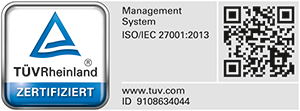
Connected Data Spaces:
Into the future with data spaces
Data Exchange - Secure and Standardized
Data-driven business models, the move towards automation and the pressures of regulatory compliance often necessitate the sharing of data across organisational boundaries. Data spaces are one of the keys to achieving simple, secure and self-determined data sharing. We are your specialist when it comes to data room technology.
What Are Data Spaces?
Protected and standardized environments enable the sovereign exchange and use of data between companies and organizations. They are based on common rules that ensure interoperability, security and control over proprietary data. Unlike traditional data silos or direct peer-to-peer exchange, they create a trustworthy collaboration in which all participants can share their data in a targeted and traceable manner without losing control of their information.
Why Should Companies Use Data Spaces?
Data spaces offer a secure, standardized and scalable solution for data exchange. They address key challenges such as control, traceability and interoperability. Through the integration of semantic standards and the coordinated orchestration of numerous, repeatable use cases, they go beyond mere technical interfaces. This means that data is not only shared securely, but also interpreted uniformly and used efficiently. In contrast to isolated peer-to-peer solutions, data spaces create a trustworthy environment that enables long-term interoperability and sustainable value creation—for greater efficiency, security and future viability.
Your Way Into the Data Space
Advantages of Data Spaces for Users and Providers
Cost efficiency & competition
- Reduction of costs through simplified data exchange and simulations instead of expensive prototypes
- Avoidance of vendor lock-in through open standards and interoperability
Quality improvement & compliance
- Early detection of problems along the supply chain
- Compliance with regulatory requirements (e.g. LkSG, DPP) through transparent data flows
Data as an economic factor
- Marketplace for the secure purchase, sale and refinement of data
- Promotion of innovative business models
Sovereignty & security
- Control over own data through federated and secure infrastructure
- Clear governance rules create trust and transparency
The Diversity of Data Spaces
There is no ‘one size fits all’ when it comes to data spaces. Industry-specific data spaces have evolved due to the diversity of use cases, standards and legal bases:
Catena-X
Connectivity the automotive industry – including small suppliers and tier 1 right up to large OEMs – in order to benefit from use cases such as parts traceability or product carbon footprint.

Manufacturing-X
Data space technology is designed to enable standardised, automated data sharing particularly in Industry 4.0 and smart factories. Examples include Factory-X, Health-Track-X and Aerospace-X.
Mobility Data Space
The Mobility Data Space creates an open data space which offers access to secure sharing and usage of real-time traffic data and sensitive mobility data, and links existing data platforms to provide comprehensive mobility data on a national level.

HEALTH-X dataLOFT
A patient-centric project enabling transparent access and control over personal health data. The objective is to develop innovative business models and applications in the healthcare sector in compliance with Gaia-X standards.
More than 20 additional data rooms
GaiaMed, EONA-X, OpenGPT-X, and much more.
Our Customers
Partnerships
Our network and, in particular, technology partnerships give us access to the latest know-how.
Certifications
Your Contact for Connected Data Spaces
Interesting blog posts
Hinweis: Bei Klick auf die Posts werden Sie zum Originalinhalt auf der jeweiligen Plattform weitergeleitet. Mehr Infos dazu in unserer Datenschutzerklärung.



